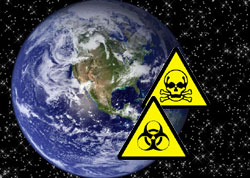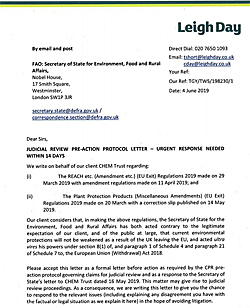 |
|
|
|
Currently the Environment Secretary, but now in the campaign to become Tory leader and PM; Michael Gove has ditched EU Environmental Protection standards regarding harmful pesticides banned by the EU.
The Tory UK government has been transferring EU Directives that have previously been 'transposed' into our legislation, e.g. health and safety at work legislation, the Working Time Directive, and consumer regulations on mobile phone tariffs; into substantive stand alone UK law. The mechanism used was created by the Withdrawal Act that doesn’t permit substantive changes to these laws. However, The Huffington Post has reported that Michael Gove is being threatened with legal action amid claims he is using ministerial powers to “delete” regulations on hazardous pesticides post-Brexit. Rachel Wearmouth’s news report explains: ‘The Chem Trust charity says the environment secretary has laid a last-minute amendment to Brexit legislation which would “substantially weaken” UK law and oversight of chemicals. ‘CHEM Trust is of the view that the Government has acted unlawfully in weakening laws that prevent the use of hazardous endocrine disrupting pesticides, and by removing participation by environment, health and consumer groups from the proposed regulatory procedure for chemicals. EU law regulates the use of pesticides, through the approval of active substances (the active ingredient in a pesticide) and the authorisation of pesticide products (plant protection products, PPPs). In carrying across this pesticides law into UK law, the Government have deleted this crucial paragraph that restricts approvals of EDCs to humans.’ Further details of her report can be read here Unionsafety web-editor, Chris Ingram adds: The principles being lost here are what has always been the UK’s stance, on consumer, food, workplace and environmental health and safety – a precautionary approach to introduction of new consumer products, chemicals, foods, workplace environments, and anything which can affect the public health. This principle is enshrined in EU legislation adopted across all of mainland Europe and in the UK as a member state of the EU. This also includes the EEA trio of nations.
Therefore chemicals should not be marketed and sold unless there is clear scientific evidence to show that they are effective and that any harm they pose to the public is minimal and controlled. The United States has no such principle and puts profit ahead of public safety, by allowing any products or chemicals to be sold unless there is clear ‘scientific evidence’ to show they are harmful. This allows US business to reject any arguments and question ‘the science’ leaving consumers having to take legal action to remove carcinogens, environmental damaging substances, poisons in food, and even asbestos in children’s toys! The outcome of such action takes years and cannot always be guaranteed to ensure a just outcome, not to mention the huge cost of taking a company to court. If we follow the US, not only will our pharmaceutical companies probably no longer be able to sell products in the Single Market, but public safety will be harmed, as this example of Gove’s jumping the gun on a trade deal with America makes all too clear. This is the price we will pay for alignment with the US and will increase illness and deaths and ensure minimal protection for the public, consumers, our environment and our children’s future. Workplace deaths from having to work with known substances that are carcinogenic and environmental pollution will increase. Finally unless we align ALL our standards with those of the US, after signing a UK/US trade deal, we will most probably be sued for £Billions, as have countries like under the Investor State Disputes Settlement procedures inherent in all trade deals the US does with other nations. For more information on ISDS, visit this webpage and for an example of Monsanto's carcinogenic pesticides e.g. Roundup read this For an example of how science is junked and distorted by chemical companies such as Monsanto read this Source: Huffington Post / ChemTrust / Business and Human Rights Resource Centre / unionsafety
|

 As a precursor of what is to come and in a move to appease the United States in advance of a trade deal, it is clear that the UK is already moving away from EU standards.
As a precursor of what is to come and in a move to appease the United States in advance of a trade deal, it is clear that the UK is already moving away from EU standards. ‘The UK Government has claimed that it would not weaken EU environmental laws when transferring them into UK law in the event of a no-deal Brexit, with Secretary of State Michael Gove stating that “We will deliver a Green Brexit, where environmental standards are not only maintained but enhanced“.
‘The UK Government has claimed that it would not weaken EU environmental laws when transferring them into UK law in the event of a no-deal Brexit, with Secretary of State Michael Gove stating that “We will deliver a Green Brexit, where environmental standards are not only maintained but enhanced“.
 Specifically on chemicals, REACH (Registration, Evaluation, Authorisation and Restriction of Chemicals) introduced under EC Regulation 1907/2006 enshrines the so-called precautionary principle.
Specifically on chemicals, REACH (Registration, Evaluation, Authorisation and Restriction of Chemicals) introduced under EC Regulation 1907/2006 enshrines the so-called precautionary principle.